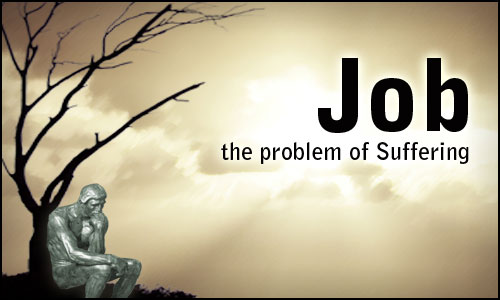Chapel Talk Archive #1 – The Bursar, Tuesday 2/12/14
O that I might have my request, and that God would grant my desire; that it would please God to crush me, that he would let loose his hand and cut me off! This would be my consolation; I would even exult in unrelenting pain; for I have not denied the words of the Holy One. What is my strength, that I should wait? And what is my end, that I should be patient?
When I studied Religious Studies for A level at Grammar School, my favourite book of the bible was the Old Testament Book of Job. It always struck me how visual, almost cinematographic, this biblical story was; and being young and ambitious, not unlike the 19th century politician William Gladstone who as a schoolboy couldn’t decide whether he wanted to become Prime Minister or the Archbishop of Canterbury, I likewise decided that if it was going to be a film then I would be the one who filmed it – in between of course becoming a famous rock star or sportsman.
Most people know the theme of the Book of Job – how a devout and righteous man of God patiently suffered every conceivable hardship and misery which was inflicted on him, but resolutely refused to blame God or to curse his Maker, accepting it was clearly part of some Divine plan. One of the central themes of the Book of Job is patience. Hence the saying the patience of Job and the idea that patience is a virtue.
However, as a young man growing up in the world, did I really understand the meaning of patience and the relevance of this theme of the Book of Job to my life and interaction with others? There are so many other virtues that are more easily grasped and appreciated – integrity and honesty and kindness to name but a few.

Patience today is often overlooked. We live in an impatient society in which everyone thirsts for the next cutting edge appliance or the next App, all of which continue to speed up the pace of life in a global community which is becoming faster and smaller.
But how seldom do we take time to see the value of being patient. Understanding that the success of a team is contingent on the support and patience invested in the weakest player. Or that the successful completion of a school project depends on the support and patience offered to the pupil who is struggling to meet the deadlines.
So what do we mean by patience? The Oxford English Dictionary is a good starting point and it defines patience as the capacity to accept or tolerate delay, problems or suffering without becoming annoyed or anxious.
Wikipedia is often a good resource and it describes patience (or forbearing) as a state of endurance under difficult circumstances, which can mean persevering in the face of delay or provocation without acting on annoyance or anger in a negative way. Patience is about being steadfast, exhibiting forbearance when under strain especially when faced with longer-term difficulties, and patience is measured by the level of endurance one can sustain before giving way to negativity.
In psychology and cognitive neuroscience, patience is studied as a decision-making problem, involving the choice of either a small reward in the short term or a more valuable reward in the long term. When given a choice, all animals, humans included, are inclined to favour short term rewards over long term gains. This is despite the often greater benefits associated with long term rewards. For example, the patience of human users in the online world has been the subject of much recent scientific research. In a 2012 study involving tens of millions of users who watched videos on the internet, the research showed that online users run out of patience in as little as two seconds while waiting for their chosen video to start playing. (An interesting concept for members of staff here today who were perhaps brought up using the ZX Spectrum or Commodore 64). The study also shows that users who are connected to the Internet at faster speeds are less patient than their counterparts connected at slower speeds, demonstrating a link between the human expectation of speed and human patience. These and other scientific studies of patience have led many social commentators to conclude that the rapid pace of technology is rewiring humans to be less and less patient.
The Stanford marshmallow experiment was a series of studies on delayed gratification in the late 1960s and early 1970s led by psychologist Walter Mischel, then a professor at Stanford University. In these studies, a child was offered a choice between one small reward provided immediately or two small rewards if they waited for a short period. The children were led into a room where a treat of their choice (cookie, marshmallow or pretzel) was placed on a table. The children could eat the marshmallow, but if they waited for fifteen minutes without giving in to the temptation, they would be rewarded with a second marshmallow. Mischel observed some would cover their eyes with their hands or turn around so that they couldn’t see the tray, others starting kicking the table or tugging on their pigtails or even stroking the marshmallow as if it were a tiny stuffed animal, while others would simply eat the marshmallow as soon as the researchers left. In follow-up studies, the researchers found that children who were able to wait longer for the preferred rewards tended to have better life outcomes, as measured by SAT scores, higher educational attainment, lower body mass index and were less prone to addictive tendencies.
In Human, All Too Human, philosopher Friedrich Nietzsche argued that being able to wait is so hard that the greatest poets did not disdain to make the inability to wait the theme of their poetry.’
And turning back to the Bible, patience occurs as a common theme, for example:
Proverb 14 an ill-tempered man stirs up strife, but a patient man allays discord
Proverb 25 through patience a ruler can be persuaded and a gentle tongue can break a bone
So in a life in which all of our tomorrows are sought today, it is very important that we take time out to reflect, to trust, to be tolerant and to be patient.
I started with the Book of Job, but my most cherished part of the New Testament is the Sermon on the Mount and this extract from the Book of Matthew in which Jesus reflects on the virtue of having faith, trust and patience:
Consider the lilies of the field, how they grow; they toil not, neither do they spin: and yet I say unto you, that even Solomon in all his glory was not arrayed like one of these.
Patience is a quality, which speaks loudly through the Bible and is as relevant and important for the pupils of The Royal Hospital School today as it was for the followers of Jesus 2,000 years ago.
Mr Church















Post Comment
You must be logged in to post a comment.